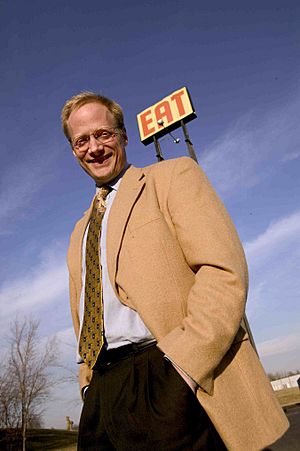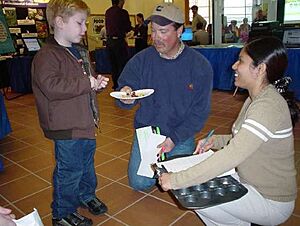Brian Wansink facts for kids
Quick facts for kids
Brian Wansink
|
|
|---|---|

Wansink in 1998
|
|
| Born | June 28, 1960 |
| Alma mater | Wayne State College (BS) Drake University (MA) Stanford University (PhD) |
| Awards | Ig Nobel Prize (2007) |
| Scientific career | |
| Fields | consumer behavior, nutrition psychology |
| Institutions | Cornell University, University of Pennsylvania, Dartmouth College, University of Illinois at Urbana-Champaign |
Brian Wansink, born on June 28, 1960, is an American former professor and researcher. He studied how people make choices about what they buy and eat. He was a professor at Cornell University, where he led the Cornell Food and Brand Lab.
His lab looked into why people choose certain foods. They also explored ways to help people make healthier food choices. However, starting in 2017, questions arose about his research. People found issues like conclusions that didn't match the information. There were also problems with how data was used and analyzed.
Because of these issues, Cornell University investigated his work. In September 2018, the university found that there were serious problems with his research. He was then removed from his teaching and research roles. He later left the university in June 2019.
Contents
Early Life and Education
Brian Wansink was born in Sioux City, Iowa. He grew up in a family where his parents worked hard. His younger brother, Craig Wansink, is also a professor.
Brian Wansink went to Wayne State College and earned a degree in business in 1982. He then studied journalism at Drake University, getting his master's degree in 1984. Later, he earned his Ph.D. in marketing from Stanford Graduate School of Business in 1990. His Ph.D. focused on understanding how consumers behave.
Career and Research
Brian Wansink taught at several universities. These included Dartmouth College and the University of Pennsylvania. He also taught at the University of Illinois at Urbana-Champaign. In 2005, he joined Cornell University. There, he became a professor in the Department of Applied Economics and Management.
Studying Food Choices
Wansink's research mainly focused on how people make food choices. For example, he studied how the size of a food portion affects how much someone eats. Some of his ideas even led to smaller packaging for certain foods.
One of his studies looked at how people's eating habits might change when they eat with someone who is overweight. However, some experts questioned if this study truly proved that idea.
The "Bottomless Bowls" Study
In 2005, Wansink's lab did a famous experiment. They published a paper called "Bottomless bowls: why visual cues of portion size may influence intake." In this study, they used special bowls that secretly refilled themselves with soup.
People eating from these "bottomless bowls" ate more soup. They didn't realize how much they were eating because the bowl never seemed to empty. In 2007, Wansink received an Ig Nobel Prize for this study. This prize is given for unusual or funny scientific achievements. Later, the data from this experiment was also questioned.
Books About Eating Habits
In 2006, Wansink wrote a book called Mindless Eating: Why We Eat More Than We Think. This book explained his research in a way that was easy for everyone to understand. It also gave tips on how to eat better.
The book talked about what, how much, and when people eat. Many organizations, like the National Action Against Obesity, found the book helpful. It offered ideas to help people manage their weight.
Wansink's second book, Slim by Design, came out in 2014. He tried to raise money online for a coaching program based on this book. However, the program was not created.
Work with the USDA
From 2007 to 2009, Brian Wansink worked for the USDA. He was the executive director of the Center for Nutrition Policy and Promotion. In this role, he helped oversee important guidelines for healthy eating in America. This included the 2010 Dietary Guidelines for Americans.
In 2011, he was chosen to be the president of the Society for Nutrition Education for one year.
Research Concerns and Retractions
Starting in 2017, serious concerns were raised about Brian Wansink's research. People found problems in many of his published papers.
The "Pizza Papers"
In January 2017, Wansink wrote a blog post that caused a lot of discussion. He mentioned how he asked a student to find interesting results from a study that didn't show much at first. This led to five new papers being published.
Experts looked closely at four of these papers, sometimes called "the pizza papers." They found that the conclusions in these papers didn't seem to be supported by the information presented. There were also many questionable numbers and mistakes in the statistical analysis. Critics said Wansink refused to share the original data, citing privacy.
Cornell University looked into these concerns. They found several cases where Wansink had reused his own work without proper credit. They also confirmed many problems with how data was handled and analyzed. Wansink was asked to hire outside experts to recheck his work.
More Papers Retracted
As time went on, more errors were found in other papers from Wansink's lab. By December 2017, six of his papers had been officially removed from scientific journals. Fourteen other papers had corrections made to them.
By March 2018, even more papers were retracted. A major medical journal, JAMA, also expressed concern about six articles Wansink had written for them. They asked Cornell to have his work checked independently. In September 2018, JAMA retracted those six papers. In total, seventeen papers written or co-written by Wansink were retracted.
Cornell's Investigation Findings
In September 2018, Cornell University finished its investigation. They concluded that Brian Wansink had engaged in scientific misconduct. This meant there were serious problems with how he conducted and reported his research.
As a result, he was removed from all teaching and research duties. He was only allowed to help with investigations into his past work. He then resigned from the university, leaving in June 2019.
Cornell released a summary of their findings. They stated that Wansink's practices included making up data and not making sure data was correct. They also found issues with who was given credit for research and how studies were done.
Personal Life
Brian Wansink is married and has three daughters. His wife studied to be a chef at Le Cordon Bleu.
See also
- List of scientific misconduct incidents
 | Victor J. Glover |
 | Yvonne Cagle |
 | Jeanette Epps |
 | Bernard A. Harris Jr. |


